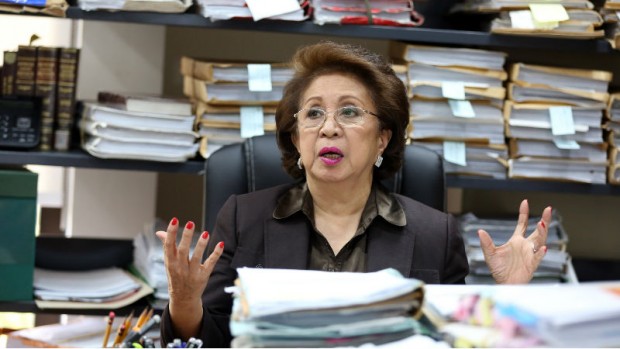
CHIEF GRAFT BUSTER Ombudsman Conchita Carpio Morales has maintained Junjun Binay cannot invoke the condonation doctrine. NIÑO JESUS ORBETA
THE Office of the Ombudsman’s ruling finding probable cause against Vice President Jejomar Binay and his son, dismissed Makati Mayor Jejomar Erwin Junjun Binay, was an act of defiance to the Supreme Court, lawyers said Wednesday.
Former Integrated Bar of the Philippines national president Vicente Joyas said the Ombudsman should have considered the Supreme Court decision last year saying the abandonment of the condonation doctrine was prospective and could be applied to Junjun Binay’s case.
“If the Ombudsman insists on not applying the condonation doctrine in the Junjun Binay case, the Ombudsman is acting in total disobedience of the ruling of the SC in the Junjun case that the abandonment of the condonation doctrine must be applied prospectively,” said Joyas.
Condonation doctrine which was introduced by jurisprudence in 1959 was abandoned by the high court in a ruling last year. But the court said it will be prospective in nature.
The doctrine states that re-elected officials cannot be held administratively liable for offenses during a previous term because their re-election meant their constituents have already forgiven them for their offenses.
The Joyas earlier said the younger Binay could still use the condonation doctrine as a defense to contest his dismissal since the SC’s abandonment of the doctrine is prospective and would apply only in future cases.
“He can still invoke the doctrine if the decision of his dismissal is premised on the non-application of the doctrine and Junjun invoked it in that case,” said Joyas.
Former University of the East law dean Amado Valdez agreed with this opinion.
“(Being prospective only) means it will only apply on cases committed after the decision. So Binay can still invoke the doctrine,” Valdez had said.
The Ombudsman last year issued preventive suspension orders against Junjun Binay over his alleged role in overpricing the construction of the Makati City Hall Building II and the Makati City Science High School.
Insisting he could not be administratively charged, Binay invoked the condonation doctrine, which clears a public official of any administrative liability in the past if he or she is re-elected. Binay served as mayor in 2010 and was re-elected in 2013.
However, the Ombudsman ended up dismissing Binay in October last year over the Makati City Hall Building II mess.
The following month, in November, the high court abandoned the condonation doctrine but clarified its application was “prospective,” meaning it would apply only in future cases.
The SC said the Court of Appeals, which temporarily stopped Binay’s preventive suspension in March 2015, did not commit grave abuse because it merely followed settled precedents on condonation, which “at that time unwittingly remained good law,” when it granted Binay a relief.
In affirming probable cause, the Ombudsman last week denied the motion for reconsideration filed by the younger Binay and the other respondents for failure to present new evidence that would warrant a reversal.
Aside from administrative liability, the younger Binay and several others were ordered prosecuted before the Sandiganbayan.
However, the case against the Vice President will have to wait after the end of his term as Vice President.